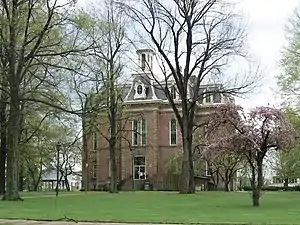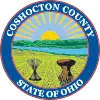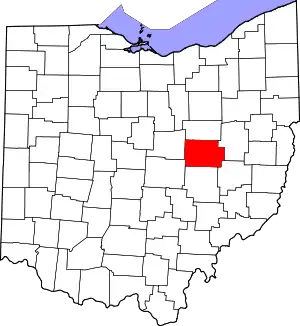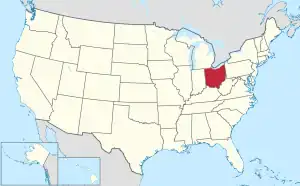Coshocton County, Ohio
Coshocton County is a county located in the U.S. state of Ohio. As of the 2020 census, the population was 36,612.[1] Its county seat and largest city is Coshocton.[2] The county lies within the Appalachian region of the state. The county was formed on January 31, 1810, from portions of Muskingum and Tuscarawas Counties and later organized in 1811.[3] Its name comes from the Delaware Indian language and has been translated as "union of waters" or "black bear crossing".[4] Coshocton was mentioned by David Zeisberger in his diary from the 1780s using the German spelling "Goschachgünk".[5] The Coshocton, OH Micropolitan Statistical Area includes all of Coshocton County.
Coshocton County | |
|---|---|
 | |
 Seal | |
 Location within the U.S. state of Ohio | |
 Ohio's location within the U.S. | |
| Coordinates: 40°18′N 81°55′W | |
| Country | |
| State | |
| Founded | April 1, 1811 |
| Named for | "union of waters" or "black bear crossing" in Delaware (Lenape) language |
| Seat | Coshocton |
| Largest city | Coshocton |
| Area | |
| • Total | 567 sq mi (1,470 km2) |
| • Land | 564 sq mi (1,460 km2) |
| • Water | 3.6 sq mi (9 km2) 0.6% |
| Population (2020) | |
| • Total | 36,612 |
| • Density | 65/sq mi (25/km2) |
| Time zone | UTC−5 (Eastern) |
| • Summer (DST) | UTC−4 (EDT) |
| Congressional district | 12th |
| Website | www |
Geography
According to the U.S. Census Bureau, the county has a total area of 567 square miles (1,470 km2), of which 564 square miles (1,460 km2) is land and 3.6 square miles (9.3 km2) (0.6%) is water.[6]
Adjacent counties
- Holmes County (north)
- Tuscarawas County (east)
- Guernsey County (southeast)
- Muskingum County (south)
- Licking County (southwest)
- Knox County (west)
Demographics
| Census | Pop. | Note | %± |
|---|---|---|---|
| 1820 | 7,086 | — | |
| 1830 | 11,161 | 57.5% | |
| 1840 | 21,590 | 93.4% | |
| 1850 | 25,674 | 18.9% | |
| 1860 | 25,032 | −2.5% | |
| 1870 | 23,600 | −5.7% | |
| 1880 | 26,642 | 12.9% | |
| 1890 | 26,703 | 0.2% | |
| 1900 | 29,337 | 9.9% | |
| 1910 | 30,121 | 2.7% | |
| 1920 | 29,595 | −1.7% | |
| 1930 | 28,976 | −2.1% | |
| 1940 | 30,594 | 5.6% | |
| 1950 | 31,141 | 1.8% | |
| 1960 | 32,224 | 3.5% | |
| 1970 | 33,486 | 3.9% | |
| 1980 | 36,024 | 7.6% | |
| 1990 | 35,427 | −1.7% | |
| 2000 | 36,655 | 3.5% | |
| 2010 | 36,901 | 0.7% | |
| 2020 | 36,612 | −0.8% | |
| U.S. Decennial Census[7] 1790–1960[8] 1900–1990[9] 1990–2000[10] 2020 [1] | |||
2000 census
As of the census[11] of 2000, there were 36,655 people, 14,356 households, and 10,164 families living in the county. The population density was 65 inhabitants per square mile (25/km2). There were 16,107 housing units at an average density of 29 units per square mile (11/km2). The racial makeup of the county was 97.35% White, 1.09% Black or African American, 0.17% Native American, 0.32% Asian, 0.03% Pacific Islander, 0.20% from other races, and 0.84% from two or more races. 0.59% of the population were Hispanic or Latino of any race. 29.4% were of German, 23.4% American, 11.6% English and 9.3% Irish ancestry according to Census 2000. 93.9% spoke English, 2.4% German, 1.5% Pennsylvania Dutch, and 0.9% Dutch as their first language.[12]
There were 14,356 households, out of which 32.60% had children under the age of 18 living with them, 57.80% were married couples living together, 9.20% had a female householder with no husband present, and 29.20% were non-families. 25.40% of all households were made up of individuals, and 11.90% had someone living alone who was 65 years of age or older. The average household size was 2.52 and the average family size was 3.01.
In the county, the population was spread out, with 26.20% under the age of 18, 7.80% from 18 to 24, 27.40% from 25 to 44, 24.00% from 45 to 64, and 14.70% who were 65 years of age or older. The median age was 38 years. For every 100 females, there were 95.50 males. For every 100 females age 18 and over, there were 92.70 males.
The median income for a household in the county was $34,701, and the median income for a family was $41,676. Males had a median income of $31,095 versus $21,276 for females. The per capita income for the county was $16,364. About 7.00% of families and 9.10% of the population were below the poverty line, including 10.40% of those under age 18 and 9.10% of those age 65 or over.
2010 census
As of the 2010 United States Census, there were 36,901 people, 14,658 households, and 10,089 families living in the county.[13] The population density was 65.4 inhabitants per square mile (25.3/km2). There were 16,545 housing units at an average density of 29.3 units per square mile (11.3 units/km2).[14] The racial makeup of the county was 97.0% white, 1.1% black or African American, 0.3% Asian, 0.2% American Indian, 0.2% from other races, and 1.2% from two or more races. Those of Hispanic or Latino origin made up 0.8% of the population.[13] In terms of ancestry, 29.5% were German, 14.2% were Irish, 11.2% were English, and 10.3% were American.[15]
Of the 14,658 households, 30.8% had children under the age of 18 living with them, 53.7% were married couples living together, 10.4% had a female householder with no husband present, 31.2% were non-families, and 26.3% of all households were made up of individuals. The average household size was 2.49 and the average family size was 2.98. The median age was 40.8 years.[13]
The median income for a household in the county was $39,469 and the median income for a family was $47,931. Males had a median income of $39,701 versus $26,706 for females. The per capita income for the county was $19,635. About 12.4% of families and 17.0% of the population were below the poverty line, including 26.0% of those under age 18 and 8.3% of those age 65 or over.[16]
Amish and Mennonite congregations
In 2020, the Amish and Mennonite population of the county was 2,724 or 7.4% of the total population.[17]
Politics
Prior to 1912, Coshocton County was Democratic in presidential elections, only voting Republican twice from 1856 to 1908. The county was a bellwether from 1912 to 1936. Starting with the 1940 election, it has become a Republican stronghold county, with Lyndon B. Johnson in 1964 and Bill Clinton in 1992 being the two lone Democrats to win the county since then.
| Year | Republican | Democratic | Third party | |||
|---|---|---|---|---|---|---|
| No. | % | No. | % | No. | % | |
| 2020 | 12,325 | 73.50% | 4,125 | 24.60% | 318 | 1.90% |
| 2016 | 10,785 | 68.87% | 4,013 | 25.63% | 861 | 5.50% |
| 2012 | 8,390 | 53.16% | 6,940 | 43.97% | 454 | 2.88% |
| 2008 | 8,675 | 51.22% | 7,689 | 45.39% | 574 | 3.39% |
| 2004 | 9,839 | 56.86% | 7,378 | 42.64% | 86 | 0.50% |
| 2000 | 8,243 | 57.77% | 5,594 | 39.21% | 431 | 3.02% |
| 1996 | 6,018 | 42.00% | 6,005 | 41.91% | 2,307 | 16.10% |
| 1992 | 5,705 | 35.27% | 6,212 | 38.41% | 4,256 | 26.32% |
| 1988 | 8,282 | 57.09% | 6,020 | 41.50% | 204 | 1.41% |
| 1984 | 9,842 | 68.71% | 4,392 | 30.66% | 89 | 0.62% |
| 1980 | 8,359 | 60.33% | 4,725 | 34.10% | 772 | 5.57% |
| 1976 | 6,361 | 50.90% | 5,827 | 46.63% | 308 | 2.46% |
| 1972 | 8,082 | 66.21% | 3,790 | 31.05% | 334 | 2.74% |
| 1968 | 7,256 | 53.59% | 5,013 | 37.03% | 1,270 | 9.38% |
| 1964 | 5,965 | 41.58% | 8,382 | 58.42% | 0 | 0.00% |
| 1960 | 9,913 | 64.75% | 5,396 | 35.25% | 0 | 0.00% |
| 1956 | 9,549 | 66.60% | 4,789 | 33.40% | 0 | 0.00% |
| 1952 | 9,832 | 62.90% | 5,799 | 37.10% | 0 | 0.00% |
| 1948 | 7,096 | 52.05% | 6,457 | 47.36% | 81 | 0.59% |
| 1944 | 7,917 | 56.38% | 6,126 | 43.62% | 0 | 0.00% |
| 1940 | 8,623 | 52.22% | 7,889 | 47.78% | 0 | 0.00% |
| 1936 | 6,449 | 40.65% | 9,316 | 58.72% | 101 | 0.64% |
| 1932 | 6,040 | 41.50% | 8,188 | 56.26% | 327 | 2.25% |
| 1928 | 9,154 | 70.58% | 3,745 | 28.87% | 71 | 0.55% |
| 1924 | 5,837 | 49.77% | 4,415 | 37.64% | 1,477 | 12.59% |
| 1920 | 6,154 | 51.07% | 5,617 | 46.61% | 280 | 2.32% |
| 1916 | 2,831 | 37.53% | 4,269 | 56.60% | 443 | 5.87% |
| 1912 | 1,984 | 27.35% | 3,465 | 47.77% | 1,805 | 24.88% |
| 1908 | 3,606 | 44.46% | 4,106 | 50.62% | 399 | 4.92% |
| 1904 | 3,715 | 49.45% | 3,545 | 47.18% | 253 | 3.37% |
| 1900 | 3,592 | 46.67% | 3,940 | 51.20% | 164 | 2.13% |
| 1896 | 3,340 | 45.23% | 3,979 | 53.89% | 65 | 0.88% |
| 1892 | 2,705 | 41.60% | 3,529 | 54.27% | 269 | 4.14% |
| 1888 | 2,768 | 42.21% | 3,567 | 54.39% | 223 | 3.40% |
| 1884 | 2,839 | 44.69% | 3,469 | 54.60% | 45 | 0.71% |
| 1880 | 2,831 | 44.99% | 3,440 | 54.67% | 21 | 0.33% |
| 1876 | 2,518 | 43.16% | 3,312 | 56.77% | 4 | 0.07% |
| 1872 | 2,252 | 45.68% | 2,656 | 53.87% | 22 | 0.45% |
| 1868 | 2,176 | 45.35% | 2,622 | 54.65% | 0 | 0.00% |
| 1864 | 2,122 | 46.40% | 2,451 | 53.60% | 0 | 0.00% |
| 1860 | 2,299 | 47.83% | 2,288 | 47.60% | 220 | 4.58% |
| 1856 | 2,162 | 48.06% | 2,281 | 50.70% | 56 | 1.24% |
Government
The county courts meet in the courthouse located in Coshocton. Built in 1875, it is still in use today.
Communities

City
- Coshocton (county seat)
Villages
Townships
Census-designated places
Unincorporated communities
References
- 2020 census
- "Find a County". National Association of Counties. Archived from the original on May 31, 2011. Retrieved June 7, 2011.
- "Ohio: Individual County Chronologies". Ohio Atlas of Historical County Boundaries. The Newberry Library. 2007. Archived from the original on April 6, 2016. Retrieved February 12, 2015.
- "Coshocton County data". Ohio State University Extension Data Center. Retrieved April 28, 2007.
- Diary of David Zeisberger: A Moravian Missionary Among the Indians ..., Volume I, books.google.de
- "2010 Census Gazetteer Files". United States Census Bureau. August 22, 2012. Archived from the original on May 4, 2014. Retrieved February 7, 2015.
- "U.S. Decennial Census". United States Census Bureau. Retrieved February 7, 2015.
- "Historical Census Browser". University of Virginia Library. Retrieved February 7, 2015.
- Forstall, Richard L., ed. (March 27, 1995). "Population of Counties by Decennial Census: 1900 to 1990". United States Census Bureau. Retrieved February 7, 2015.
- "Census 2000 PHC-T-4. Ranking Tables for Counties: 1990 and 2000" (PDF). United States Census Bureau. April 2, 2001. Archived (PDF) from the original on March 27, 2010. Retrieved February 7, 2015.
- "U.S. Census website". United States Census Bureau. Retrieved January 31, 2008.
- results Archived August 15, 2013, at the Wayback Machine (reference does not show any data)
- "DP-1 Profile of General Population and Housing Characteristics: 2010 Demographic Profile Data". United States Census Bureau. Archived from the original on February 13, 2020. Retrieved December 27, 2015.
- "Population, Housing Units, Area, and Density: 2010 - County". United States Census Bureau. Archived from the original on February 13, 2020. Retrieved December 27, 2015.
- "DP02 SELECTED SOCIAL CHARACTERISTICS IN THE UNITED STATES – 2006-2010 American Community Survey 5-Year Estimates". United States Census Bureau. Archived from the original on February 13, 2020. Retrieved December 27, 2015.
- "DP03 SELECTED ECONOMIC CHARACTERISTICS – 2006-2010 American Community Survey 5-Year Estimates". United States Census Bureau. Archived from the original on February 13, 2020. Retrieved December 27, 2015.
- Leip, David. "Dave Leip's Atlas of U.S. Presidential Elections". uselectionatlas.org. Retrieved May 1, 2018.
Further reading
- Thomas William Lewis, History of Southeastern Ohio and the Muskingum Valley, 1788-1928. In Three Volumes. Chicago: S.J. Clarke Publishing Co., 1928.
External links
- Coshocton County Government's website Archived January 24, 2018, at the Wayback Machine